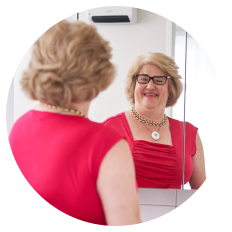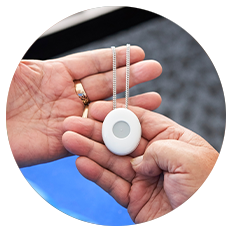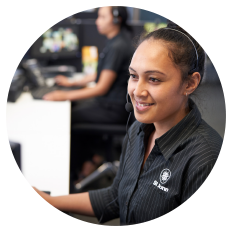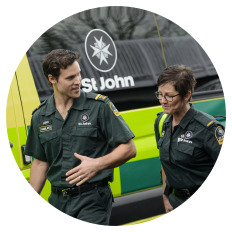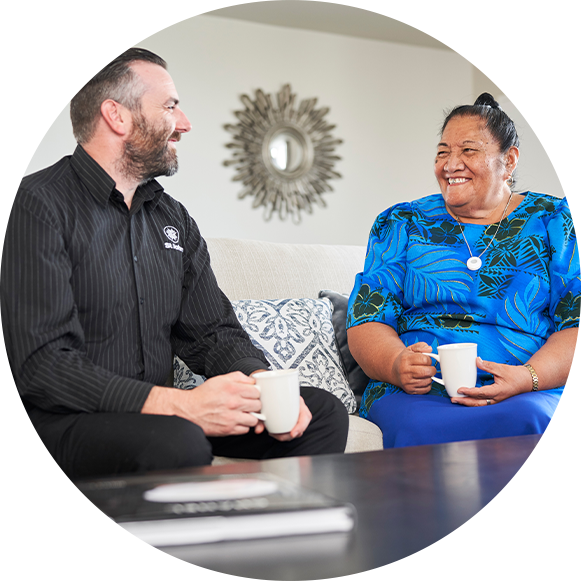Typically, seniors treasure their independence, and not being able to live alone any more can be a major blow. They may fear what will happen if they can no longer do so.
You may not always be able to be there to help, but a St John Medical Alarm can ensure that if problems arise, they will have access to assistance 24/7.
Should your elderly parent or loved one continue to live alone? Here are some signs that can indicate whether they may be placing themselves at risk by remaining on their own.1
1. They’ve fallen (often more than once)
One of the greatest dangers for the elderly is the risk of falling. Approximately a third of New Zealanders over 65 have falls each year.2 By the time they reach 80, one out of two is at risk of falling.2
Your parent may not tell you that they have fallen, tripped or slipped, in fear that doing so may lead to the loss of their independence, so it’s important that you watch for telltale signs, such as new cuts or bruises on their skin. There may be scrapes or marks on the walls or on the furniture. Sometimes unexpected items have simply been left on the floor, perhaps because they don't want to bend down and pick them up (in case they lose their balance and fall again).
2. They've become isolated or socially withdrawn
Some seniors may stay at home more often than they have in the past. Others may find it increasingly difficult to get out to social events, to see friends or to go to the supermarket.
Depression and anxiety can be an issue for some, making it challenging for them to mix and mingle outside the home.
Unfortunately, enforced isolation can lead to loneliness and may create even more problems.
3. Their home is no longer spotless
It can be a struggle for the elderly to manage household chores on a regular basis. If they've always prided themselves on a clean, tidy home, then a messy, unclean environment can be an indication that they're no longer coping as well as they might. Vacuum cleaners can be heavy and difficult to push around, and high and low places can be harder to reach for aging bodies.
Stacks of unopened mail can also be an indication that something is not quite right.
4. Your loved one is neglecting their personal hygiene
If your elderly parent begins neglecting daily self-hygiene such as toothbrushing, showering or even just not bothering to get dressed, it may be a sign that something is wrong.
They may find themselves physically incapable of performing the usual rituals of daily living without some help. Or it may be an indicator of some impairment.
5. They are losing weight
Unexplained weight loss in seniors may be a sign of self-neglect or could indicate a problem with their physical or mental health.
6. They're having trouble with familiar, simple tasks
If your loved one is now struggling to carry out tasks that they used to perform easily, that may indicate that they need more help.
7. They forget their medication
If your loved one regularly forgets to take their medication or doesn't remember if they have had their pills on a typical day, that can be an indication that they need more assistance.
8. Your loved one struggles with preparing meals
Can they still cook for themselves? Are their meal choices healthy? Can they still operate kitchen facilities safely?
If you feel that some of these signs are now evident in your loved one's life, it is important to take a closer look at their present housing situation and living environment, to determine just how much these issues might affect your loved one’s quality of life and their safety. Some problems can be solved by practical means (such as bringing in outside help or arranging for prepared meals to be delivered regularly). Other issues might require a reassessment of your loved one’s ability to continue living independently
Putting Your Mind at Rest
Wherever possible, encourage your elderly loved ones to continue independent living for as long as they can, to enable them to maintain their quality of life and their social, cognitive and physical skills.
There are safeguards that you can put in place to ensure that your loved ones are both safe and comfortable while remaining on their own and independent. These include:
Get outside help
Your parent may insist that they are completely capable of living at home by themselves, which can make it difficult for you to arrange the help that they really need. Instead, see where your loved one might accept just a little assistance, such as with cleaning the house or doing some gardening. Then organise an independent helper. They can help your parent feel more comfortable asking for more help in the future, while providing additional support to monitor their wellbeing regularly.
Encourage them to sign up for a free trial of a St John Medical Alarm
It’s natural, for those whose elderly parents live on their own, to be concerned about what might happen if their loved ones have an accident or a medical event and there’s no-one around to help. That’s where a St John Alarm can make all the difference. If you can't be there for your loved ones all day and all night, someone else can. A St John Alarm connects directly to Hato Hone St John so help is at hand 24/7. Just by pressing the alarm button, the wearer can talk to a team member in the Hato Hone St John monitoring response centre, who will organise help if required.
With a St John Alarm, your loved ones can continue to live alone and still get help if they need it.




